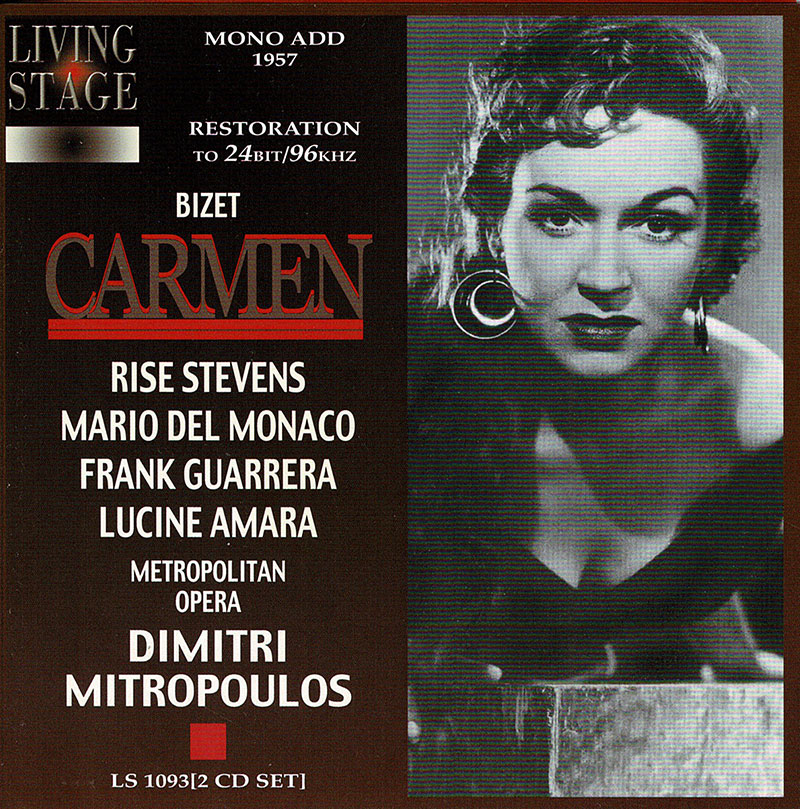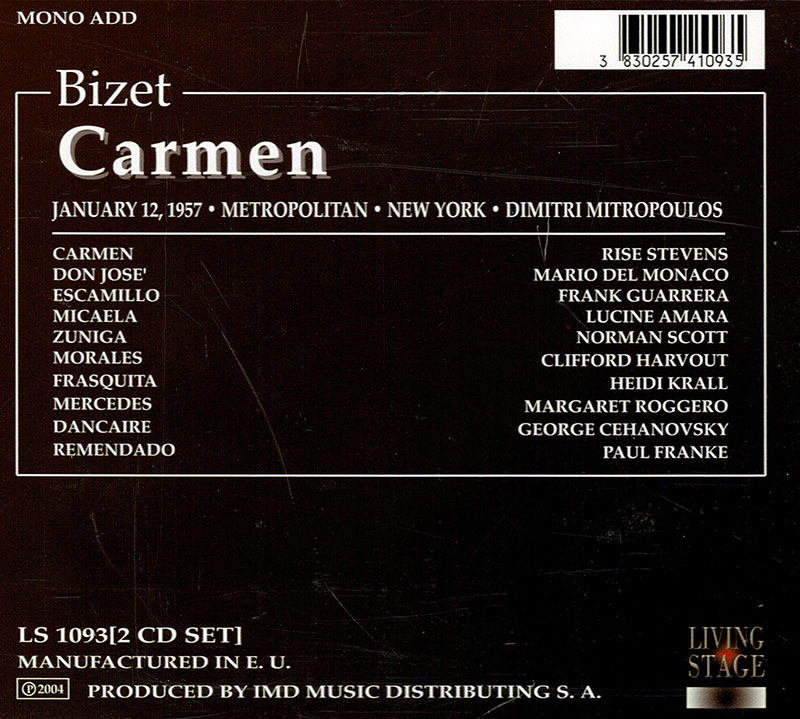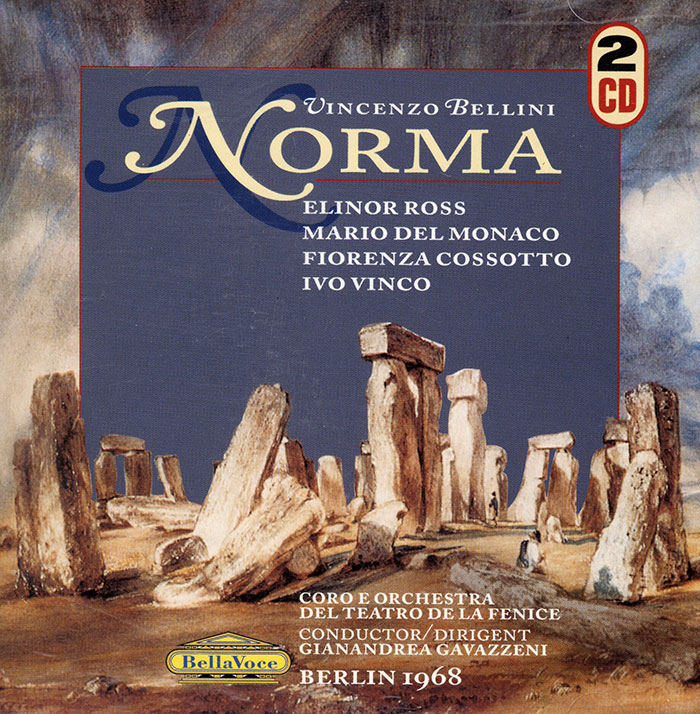Logowanie
Dziś nikt już tak genialnie nie jazzuje!
Bobby Hutcherson, Joe Sample
San Francisco
SHM-CD/SACD - NOWY FORMAT - DŻWIĘK TAK CZYSTY, JAK Z CZASU WIELKIEGO WYBUCHU!
Wayne Shorter, Freddie Hubbard, Herbie Hancock, Ron Carter, Elvin Jones
Speak no evil
UHQCD - dotknij Oryginału - MQA (Master Quality Authenticated)
Chesky! Niezmiennie perfekcyjny
Winylowy niezbędnik
ClearAudio
Double Matrix Professional - Sonic
najbardziej inteligentna i skuteczna pralka do płyt winylowych wszelkiego typu - całkowicie automatyczna
BIZET, Rise Stevens, Mario del Monaco, Frank Guarrera, The Metropolitan Opera Orchestra and Chorus, Dimitri Mitropoulos
Carmen

CRITIC REVIEWS: "The strong-lung mode of the afternoon is maintained by Del Monaco. Don José can be played as macho man, and our tenor does so. The manner is inherent in his robust instrument....we know full well that we have been transported from Seville to CAVALLERIA's stark Sicilian landscape." - Paul Jackson, SIGN-OFF FOR THE OLD MET, p.131 "It was always a given that del Monaco possessed a remarkably powerful, steady voice with unsurpassed brilliance and power. He was, however, often criticized for singing with little finesse, for using his power unrelentingly. That was never true (his many live broadcast recordings give even stronger evidence of his ability to sing with light and shade). I found myself thrilling to the sheer sound of the voice and to the commitment and passion with which he sang. What will surprise many is the variety of dynamics and color that the tenor did bring to his singing. It is easy for critics to comment on the method of a singer and to forget the most important element - the sound of the voice....His diction was a model of clarity and crispness, his intonation was almost always centered, and his rhythmic pulse was extremely strong. In many cases one listens to this kind of singing and longs for the days gone by when there were singers like this....old-timers...reminisce over one of the great operatic tenor voices to be heard in the 1950s and 60s, and younger listeners discover what a great 'tenore di forza' sounds like. We have nothing like him today." - Henry Fogel, FANFARE "Mario del Monaco was one of the most widely recorded singers of the 1950's and 60's and divided his busy operatic career between Europe and America during those years. Sir Rudolf Bing, then manager of the Metropolitan Opera, heard Mr. del Monaco's debut as Radames in Verdi's AIDA at the San Francisco Opera in 1950 and asked the tenor to stop in New York for a guest appearance at the Met in Puccini's MANON LESCAUT on his way back to Europe. Mr. del Monaco's singing made a distinct impression and won him a long and prosperous relationship with the Met beginning the next year. At the New York company from 1951 to 1959, he sang 102 times, in 16 roles. He appeared on the Met's tour 38 times. His last performance at the Met was as Canio in Leoncavallo's PAGLIACCI in 1959. But he returned three years later to Carnegie Hall in a concert of arias and duets with Gabriella Tucci. Indeed, when Mr. del Monaco was loved, it was for the brilliant, stentorian quality of his voice rather than for his subtlety of phrase or ability to act. And in a profession often peopled by overweight tenors, Mr. Del Monaco offered a classic profile and dark good looks that made him an attractive presence on stage. Mario del Monaco was born in Florence in 1915 and grew up in nearby Pesaro where his father was employed in city government. His parents were both musically inclined and encouraged his singing. Although he had some lessons, he was largely self-taught. Mr. del Monaco made his professional debut in Puccini's MADAMA BUTTERFLY in Milan in 1941. He spent the war years in the Italian Army. After the war, Mr. del Monaco's career blossomed and spread to Milan's La Scala and London's Covent Garden as well as opera houses in Rome, Naples, Barcelona, Lisbon and Stockholm. In 1946, he sang in Buenos Aires and Rio de Janeiro, moved northward to Mexico City and then on to San Francisco for his American debut. Mr. del Monaco's relationship with the Metropolitan Opera ended in 1959, reportedly by mutual consent, but he was recording until the end of the 1960's. In 1973, he joined a gathering of prominent tenors in Naples to honor Caruso's centenary and pres reports spoke of his 'personal glamour and still thrilling dynamism'. Mr. del Monaco retired to his villa near Venice later in 1973 and turned to teaching. Mr. del Monaco and his wife, Rina Fedora, a former singer, had two sons. One of them, Giancarlo, is now a stage director in Europe's opera world." - Bernard Holland, THE NEW YORK TIMES, 19 Oct., 1982 "Miss Amara is another of those American singers whose longevity astounds the opera chronicler. In her case, the record is particularly impressive. Probably more than any major soprano of the last fifty years, she was the classic house soprano, taking on an amazing variety of roles and maintaining in them a level of vocalism that demands respect." - Paul Jackson, SIGN-OFF FOR THE OLD MET, p.111 "The Amara sound as first encountered was round, free, limpid, clear, flexible, youthful in the extreme, and had an incredible spin on it. The soprano maintained these characteristics longer than just about any other singer I've ever heard or known anything about. No wonder Rudolf Bing cast her as the Celestial Voice in DON CARLOS, the inaugural production of his regime as general manager of the Met. More than half a century went by between the time, a few years later, when Bing famously said: 'She is singing like an angel! An angel!' With awesome intestinal fortitude, she [subsequently] sued the Met for age discrimination in 1977. The company had offered her a contract she deemed to be demeaning when she was not only still in fine voice but producing a sound somewhat larger and richer than she had in earlier years, which wonderful performances of TOSCA, TURANDOT (and I do mean the title role, in which she was terrific), and Elsa in LOHENGRIN in particular proved. The mighty Metropolitan initially felt secure in its ability to prevail over a disgruntled, aging soprano, and in certain other quarters as well, her courage made her a pariah....those who mattered most stood by her and were present to rejoice when, after the suit was settled to her benefit (and the Met's, though company spokesmen were for some time loath to admit that having her back was a boon), she returned to the Lincoln Center stage after almost three years' absence as Amelia in BALLO IN MASCHERA. That was in 1981, and her Met farewell was not for another entire decade, a statistic that truly speaks for itself." - Bruce Burroughs, Zinka Milanov biographer “With his slender but firm voice and winning stage presence, Frank Guarrera was a fixture at the Met in a number of roles: Escamillo in CARMEN (his début role in 1948), Marcello in LA BOHÈME, Valentin in FAUST. He also essayed larger, Verdian roles with honor, if not quite the vocal opulence of contemporaries like Robert Merrill, or Leonard Warren, whom he replaced as Simon Boccanegra a few days after Mr. Warren’s death onstage in 1960. In 1948, when the 24-year-old Mr. Guarrera was participating in the Metropolitan Opera’s ‘Auditions of the Air’ (a precursor of the current National Council Auditions), which he eventually won, Toscanini heard him on the radio singing Ford’s monologue from FALSTAFF and arranged for an audition. The result was Mr. Guarrera’s engagement at La Scala in Boito’s NERONE on the 30th anniversary of Boito’s death. It was the first of several performances under Toscanini; Mr. Guarrera sang Ford on the conductor’s legendary 1950 FALSTAFF broadcasts, still available on CD. His final role at the Met was Gianni Schicchi, which he last sang in 1976. After his retirement from the stage, he taught at the University of Washington in Seattle for 10 years." - Anne Midgette, THE NEW YORK TIMES, 27 Nov., 2007



































